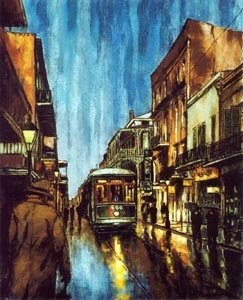Blanche DuBois

When the play begins, Blanche is already a fallen woman in society’s eyes. Her family fortune and estate are gone, she lost her young husband to suicide years earlier, and she is a social pariah due to her indiscrete sexual behavior. She also has a bad drinking problem, which she covers up poorly. Behind her veneer of social snobbery and sexual propriety, Blanche is an insecure, dislocated individual. She is an aging Southern belle who lives in a state of perpetual panic about her fading beauty. Her manner is dainty and frail, and she sports a wardrobe of showy but cheap evening clothes. Stanley quickly sees through Blanche’s act and seeks out information about her past.
In the Kowalski household, Blanche pretends to be a woman who has never known indignity. Her false propriety is not simply snobbery, however; it constitutes a calculated attempt to make herself appear attractive to new male suitors. Blanche depends on male sexual admiration for her sense of self-esteem, which means that she has often succumbed to passion. By marrying, Blanche hopes to escape poverty and the bad reputation that haunts her. But because the chivalric Southern gentleman savior and caretaker (represented by Shep Huntleigh) she hopes will rescue her is extinct, Blanche is left with no realistic possibility of future happiness. As Blanche sees it, Mitch is her only chance for contentment, even though he is far from her ideal.
Stanley’s relentless persecution of Blanche foils her pursuit of Mitch as well as her attempts to shield herself from the harsh truth of her situation. The play chronicles the subsequent crumbling of Blanche’s self-image and sanity. Stanley himself takes the final stabs at Blanche, destroying the remainder of her sexual and mental esteem by raping her and then committing her to an insane asylum. In the end, Blanche blindly allows herself to be led away by a kind doctor, ignoring her sister’s cries. This final image is the sad culmination of Blanche’s vanity and total dependence upon men for happiness.
Stanley Kowalski
_05.jpg)
Audience members may well see Stanley as an egalitarian hero at the play’s start. He is loyal to his friends and passionate to his wife. Stanley possesses an animalistic physical vigor that is evident in his love of work, of fighting, and of sex. His family is from Poland, and several times he expresses his outrage at being called “Polack” and other derogatory names. When Blanche calls him a “Polack,” he makes her look old-fashioned and ignorant by asserting that he was born in America, is an American, and can only be called “Polish.” Stanley represents the new, heterogeneous America to which Blanche doesn’t belong, because she is a relic from a defunct social hierarchy. He sees himself as a social leveler, as he tells Stella in Scene Eight.
Stanley’s intense hatred of Blanche is motivated in part by the aristocratic past Blanche represents. He also (rightly) sees her as untrustworthy and does not appreciate the way she attempts to fool him and his friends into thinking she is better than they are. Stanley’s animosity toward Blanche manifests itself in all of his actions toward her—his investigations of her past, his birthday gift to her, his sabotage of her relationship with Mitch.
In the end, Stanley’s down-to-earth character proves harmfully crude and brutish. His chief amusements are gambling, bowling, sex, and drinking, and he lacks ideals and imagination. His disturbing, degenerate nature, first hinted at when he beats his wife, is fully evident after he rapes his sister-in-law. Stanley shows no remorse for his brutal actions. The play ends with an image of Stanley as the ideal family man, comforting his wife as she holds their newborn child. The wrongfulness of this representation, given what we have learned about him in the play, ironically calls into question society’s decision to ostracize Blanche.
Harold “Mitch” Mitchell

Perhaps because he lives with his dying mother, Mitch is noticeably more sensitive than Stanley’s other poker friends. The other men pick on him for being a mama’s boy. Even in his first, brief line in Scene One, Mitch’s gentlemanly behavior stands out. Mitch appears to be a kind, decent human being who, we learn in Scene Six, hopes to marry so that he will have a woman to bring home to his dying mother.
Mitch doesn’t fit the bill of the chivalric hero of whom Blanche dreams. He is clumsy, sweaty, and has unrefined interests like muscle building. Though sensitive, he lacks Blanche’s romantic perspective and spirituality, as well as her understanding of poetry and literature. She toys with his lack of intelligence—for example, when she teases him in French because she knows he won’t understand—duping him into playing along with her self-flattering charades.
Though they come from completely different worlds, Mitch and Blanche are drawn together by their mutual need of companionship and support, and they therefore believe themselves right for one another. They also discover that they have both experienced the death of a loved one. The snare in their relationship is sexual. As part of her prim-and-proper act, Blanche repeatedly rejects Mitch’s physical affections, refusing to sleep with him. Once he discovers the truth about Blanche’s sordid sexual past, Mitch is both angry and embarrassed about the way Blanche has treated him. When he arrives to chastise her, he states that he feels he deserves to have sex with her, even though he no longer respects her enough to think her fit to be his wife.
The difference in Stanley’s and Mitch’s treatment of Blanche at the play’s end underscores Mitch’s fundamental gentlemanliness. Though he desires and makes clear that he wants to sleep with Blanche, Mitch does not rape her and leaves when she cries out. Also, the tears Mitch sheds after Blanche struggles to escape the fate Stanley has arranged for her show that he genuinely cares for her. In fact, Mitch is the only person other than Stella who seems to understand the tragedy of Blanche’s madness.
http://sparknotes.com/lit/streetcar/canalysis.html



No comments:
Post a Comment